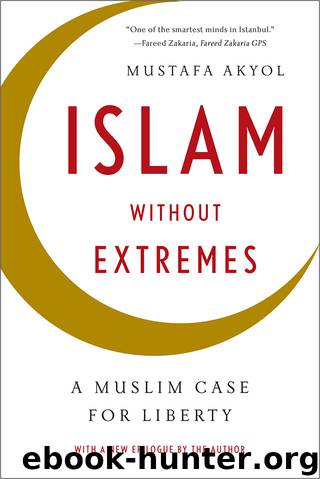Islam without Extremes by Mustafa Akyol

Author:Mustafa Akyol
Language: eng
Format: epub
Publisher: W. W. Norton & Company
Published: 2011-06-14T04:00:00+00:00
THE MAKING OF “TURKISH-ISLAMIC EXCEPTIONALISM”
The brief history of Said Nursi helps illustrate the “exceptionalism” of Turkish Islam, which, according to Turkish sociologist Şerif Mardin, is too often overlooked by contemporary Western scholars because of their “concentration on Arab or Salafi Islam.”11
This exceptionalism has a lot to do with the uniqueness of Turkish political history, which created conditions that other Muslim nations of the modern era did not experience. First of all, unlike most other Muslim countries, Turkey was never colonized by European powers. For Turkey’s Muslims, this meant that the “other” was not necessarily the West, as was the case for most Arab and Indian/Pakistani Muslims. The “other” for Turkish Islam was homegrown authoritarian secularism. In fact, the West would appear to Turkish Muslims, from the 1990s onward, as an ally, for it showed more respect to religious freedom than shown by Turkey’s self-styled secularism.
Second, even though Turkey’s secularists were unmistakably authoritarian, they nonetheless were more restrained and less arbitrary than others in the Muslim world, such as the two shahs of Iran and the secular dictators in the Arab world. Unlike those countries, Turkey had a tradition of constitutional and parliamentary rule that was rooted in the Ottoman reforms of the nineteenth century. As a result, the Kemalists could not forestall free elections forever and had to accept multiparty politics after each period of ideological restoration.
This meant that, for a pious Muslim in Turkey who felt oppressed by the regime, the proverbial light at the end of the tunnel was the ballot box, which repeatedly brought to power center-right political parties, such as the DP. But in Iran, where the shah’s absolutism left no space for democratic politics, the only way out was revolution. In Egypt and Algeria, where democracy was neither deeply rooted nor allowed to grow, the option would be, at least for some, jihad.
A third factor contributing to the exceptionalism of modern Turkish Islam was its strong aversion to Communism, an antipathy unparalleled in the Arab world. This had two explanations. First, from the beginning of the Cold War, Moscow proved to have designs on Turkey. The idea of a Soviet invasion, evoking vivid memories of the Ottoman-Russian enmity, became the nightmare of most Turks, including the devoutly Islamic ones. Second, the Turkish Marxist Left, which became a formidable force from the early 1960s onward, was vehemently antireligious. Therefore, throughout the Cold War, for most Muslims in Turkey, the enemy was “godless Communism,” whereas the West, especially America, looked much more acceptable. “Americans believe in God, they respect our religion,” wrote a popular Islamic pundit in 1969. “They are the People of the Book; but the Reds are infidels.”12
Said Nursi was the archetype of this stance. His epistles were full of denunciations of Communism, which he regarded as the political outcome of philosophical materialism. That’s why he supported the DP government’s decision to send troops to Korea in order to fight “the Reds,” and he even encouraged one of his students to enlist as a volunteer. He also hoped to build a Muslim-Christian alliance against aggressive atheism.
Download
This site does not store any files on its server. We only index and link to content provided by other sites. Please contact the content providers to delete copyright contents if any and email us, we'll remove relevant links or contents immediately.
| Anthropology | Archaeology |
| Philosophy | Politics & Government |
| Social Sciences | Sociology |
| Women's Studies |
The Secret History by Donna Tartt(19090)
The Social Justice Warrior Handbook by Lisa De Pasquale(12190)
Thirteen Reasons Why by Jay Asher(8912)
This Is How You Lose Her by Junot Diaz(6887)
Weapons of Math Destruction by Cathy O'Neil(6281)
Zero to One by Peter Thiel(5802)
Beartown by Fredrik Backman(5755)
The Myth of the Strong Leader by Archie Brown(5508)
The Fire Next Time by James Baldwin(5447)
How Democracies Die by Steven Levitsky & Daniel Ziblatt(5219)
Promise Me, Dad by Joe Biden(5154)
Stone's Rules by Roger Stone(5088)
A Higher Loyalty: Truth, Lies, and Leadership by James Comey(4964)
100 Deadly Skills by Clint Emerson(4926)
Rise and Kill First by Ronen Bergman(4789)
Secrecy World by Jake Bernstein(4753)
The David Icke Guide to the Global Conspiracy (and how to end it) by David Icke(4720)
The Farm by Tom Rob Smith(4514)
The Doomsday Machine by Daniel Ellsberg(4490)
